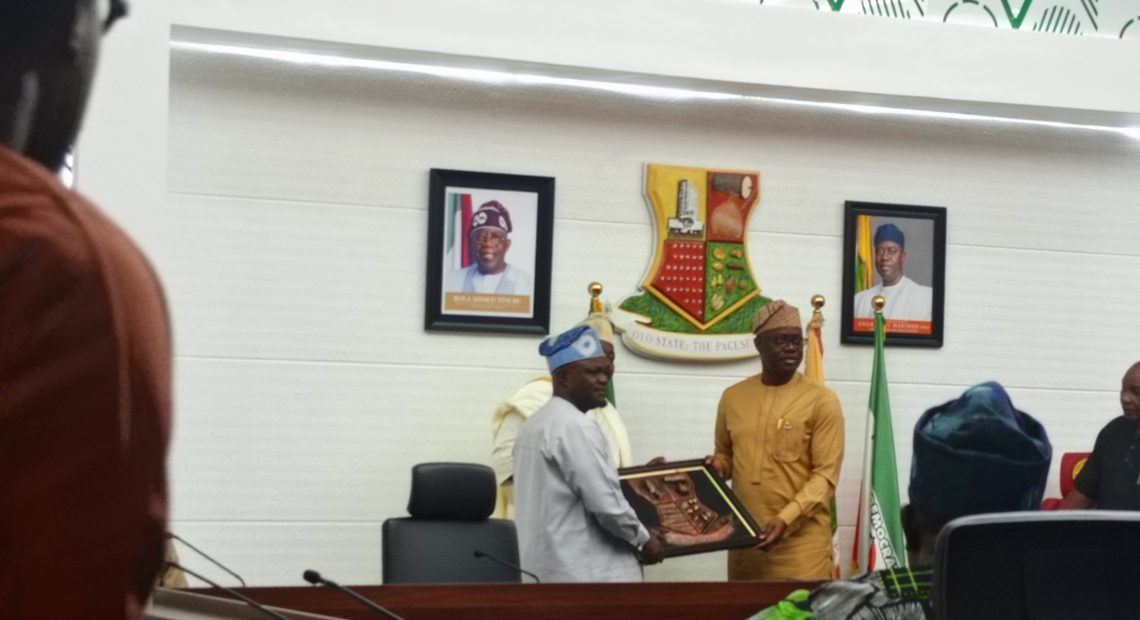By Iyabo Adebisi Governor Seyi Makinde of Oyo state has urged the National Assembly Committee on Electoral Matters to give Nigerians an amended electoral act that would reflect the yearnings of the country and put it on the trajectory of development. He stated this during a working visit of Continue Reading
By Mojisola Oladele Osun State House of Assembly sets up House of Assembly Standing Committees for 8th Assembly. The composition of the House of Assembly Committee was announced by the Speaker of the Parliament, Prince Adewale Egbedun during the Plenary of the House. Prince Egbedun said the committees were set up to enable the 8th […]Continue Reading
By Mosope Kehinde Political office holders, business associates, friends and well-wishers joined the Ogundoyin family to pay their last respect to Chief Mrs Justina Ogundoyin, mother of the Speaker, Oyo State House of Assembly, Adebo. At the funeral service held on Friday at Eleruwa Stadium, Eruwa in the Ibarapa zone of Oyo state, in his […]Continue Reading
By Funmi Adekoya Governor Ademola Adeleke of Osun State says he will complete all ongoing projects of the previous administration in the state. Governor Adeleke stated this when he received members of the Osun State House of Assembly who paid a courtesy visit at the Executive lounge of the Governor’s Office, Abere. He said his […]Continue Reading
The Ogun State House of Assembly has passed a resolution approving the revised 2022-2024 State Medium Term Expenditure Framework MTEF. The approval followed the presentation of the report of the Committee on Finance and Appropriation by its Chairman, Mr Kunle Sobukanla, who subsequently moved the motion for its adoption, and supported by the Whole House through […]Continue Reading
Governor Dapo Abiodun of Ogun state is expected to present the 2022 Appropriation Bill before the State House of Assembly on Tuesday, next week.The budget presentation is In line with Section 121 of the 1999 Constitution of the Federal Republic of Nigeria, as amended . The Deputy Clerk of the Assembly, Mrs.Funmi Adeyemi, in a […]Continue Reading
In Ekiti State, over one hundred billion nairas is to be spent in the 2022 fiscal year. The budget Proposal christened “budget of Legacy and Consolidation” was presented by the Governor of the state, Dr Kayode Fayemi before members of the Ekiti State House of Assembly during a plenary in Ado Ekiti. The 2022 budget […]Continue Reading
In every democratic setting, there are three basic arms of government which are the executive, the legislature and the judiciary. These arms are independent in their operations and at the same time serve as checks and balances on one another to avoid over concentration of power in a single authority. Though the primary responsibility of […]Continue Reading
Oyo state House of Assembly has demanded investigation into recent kidnappings, killings and alleged Police invasion of Ajaawa in Ogo-oluwa local government area of the state, with a view to curbing recurrence. In a matter of urgent public importance brought to the house by Mr Simeon Oyeleke, the lawmaker raises alarm over increase in kidnap […]Continue Reading
The Speaker, Osun House of Assembly, Mr. Timothy Owoeye has described agitation for financial autonomy of the state Legislature as a weapon to curb the excesses of Executive arm of government. Mr. Owoeye who stated this during the plenary at the State House of Assembly, Osogbo, frowned at the non implementation of the financial autonomy […]Continue Reading
Plenary and other legislative activities were grounded at the Ogun Assemby as Parliamentary Staff Association of Nigeria, PASAN, state chapter, joined other 35 states of the federation on an indefinite strike. Radio Nigeria reports that the strike was as a result of the refusal of government to implement financial autonomy for state houses of Assembly as Continue Reading
Members of the Oyo State House of Assembly have visited the family of the late former Governor of Oyo State, Senator Isiaq Abiola Ajimobi. On the occasion, the Oyo lawmakers presented a letter of condolence to the widow of the deceased, Mrs Florence Ajimobi. L-r: Widow, Dr (Mrs) Florence Ajimobi, Speaker, House of Assembly, Rt. […]Continue Reading
